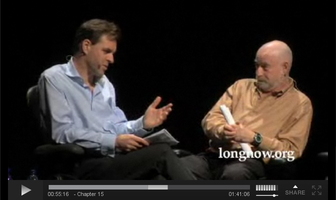 Niall Ferguson and Peter Schwartz debate their professions and writings as
part of a Long Now Foundation event. While fun to watch from the high-school argument perspective, I would rather have seen more time allocated towards trying to construct
a workable future. I mean, it's fine to officiate a public mind-share pissing-match, I just expected more from something called the "long now" foundation.
Niall Ferguson and Peter Schwartz debate their professions and writings as
part of a Long Now Foundation event. While fun to watch from the high-school argument perspective, I would rather have seen more time allocated towards trying to construct
a workable future. I mean, it's fine to officiate a public mind-share pissing-match, I just expected more from something called the "long now" foundation.
At one point in the talk, they discuss the 2008 global financial meltdown. Schwartz indicates the ur-cause lies in the "one more hit of heroin and then I'll quit" mentality
on Wall ST. I think he's on the right trail: in order to get massive Fails, the majority of participants need to have individual incentives that (while short-term
profitable) ultimately ruin it for everyone.
So, despite an evolution in rules (which Schwartz should have rested his argument on, instead of being led to technology by Ferguson) by which we organize ourselves,
we still encounter Tragedies of the Commons. My question to the two of them would have been why? Is it merely due to short-term profit-seeking?
Imagine that you live in a slightly pessimistic future where the prices of essential foods gets spiky (like in SoylentGreenShouldBePoliticians ) and
you have a choice between living in a world where:
- only one organization can legitimately use violence as a solution and
you don't belong to that organization, or,
- every country can legitimately use violence
Which would you choose?
 Niall Ferguson and Peter Schwartz debate their professions and writings as
part of a Long Now Foundation event. While fun to watch from the high-school argument perspective, I would rather have seen more time allocated towards trying to construct
a workable future. I mean, it's fine to officiate a public mind-share pissing-match, I just expected more from something called the "long now" foundation.
Niall Ferguson and Peter Schwartz debate their professions and writings as
part of a Long Now Foundation event. While fun to watch from the high-school argument perspective, I would rather have seen more time allocated towards trying to construct
a workable future. I mean, it's fine to officiate a public mind-share pissing-match, I just expected more from something called the "long now" foundation.